#u.s. army recruitment
Explore tagged Tumblr posts
Text

Peace is America’s most important business! U.S. Army recruitment ad - 1947.
#vintage illustration#vintage advertising#u.s. military#army recruitment ad#army recruitment#u.s. army#armed forces#u.s. army recruitment#2nd infantry division#3rd infantry division#1st infantry division#7th infantry division#5th infantry division#6th infantry division#4th infantry division#8th infantry division#9th airborne division#10th mountain division#24th infantry division#25th infantry division#82nd airborne division#101st airborne division#3rd armored division#2nd armored division#5th armored division#11th airborne division#united states army
17 notes
·
View notes
Text

1950 Wanted… More Men Like Mike! U.S. Army
Source: Colliers Magazine
Published at: https://digitalposterarchive.com/1945-1991-cold-war/usa-cold-war-propaganda-collection/
0 notes
Video
Farm to Win "Over There" by Library Company of Philadelphia Via Flickr: World War I-era poster places the image of a boy plowing over a battle in the background to recruit young men to join the U.S. Boys' Working Reserve, "the army behind the army." Published by the U.S. Department of Labor; artist: Adolph Treidler, ca. 1917-1919. Accession Number: P.2284.239 Click here to view the record of this poster on ImPAC, the Library Company's digital collections catalog.
#World War I#U.S. Department of Labor#recruitment poster#U.S. Boys' Working Reserve#The Army behind the Army#plow#Library Company of Philadelphia#flickr
0 notes
Text
I have talked a few times about Psychological Operations or psyops on here, but I would like to point out a real world example of a PO Operation that was found out recently by the Department of Justice.
Before that though, If you would like to read more about the actual position of a PO soldier, you can look no further then the PO benefits page on the US Army special operations recruitment website (https://www.goarmysof.army.mil/PO/).
Personally I feel like many people still believe psyops to be some kind of conspiracy theory instead of a fairly standard military division in almost all modern militaries, anyways onto the example.
The US Department of Justice is going after (indicting) two RT (Russian state media) employees for committing fraud and violating the Foreign Agents Registration Act.
Basically they created a front "media" company in Tennessee, translated russian propaganda videos into english, then paid right-wing influencers to promote (reblog/retweet/talk about on streams) said videos.
Three of the named influencers that I could find were Tim Pool, Dave Rubin and Benny Johnson.
I honestly have no idea who these three are, but supposedly their platforms have millions of followers. Also, some of these influencers were paid up too $100,000 a week to promote their videos and messaging.
So to summarize, Russia setup a fake company to pay American influencers to repeat their lies so that their followers would interpret those lies as legitimate since their were coming from a source they trust.
When people talk about election interference this is what we are talking about.
$100K a week is insane money for most, I am sure many people would be hard pressed to not sell their soul for that much money. Many of the videos from this media company were lies about the Ukraine war, and looking into Tim Pool it seems he also has a very anti-Ukraine stance (Audio from one of this podcasts https://v.redd.it/41xgvuri0vmd1/DASH_AUDIO_128.mp4)
I generally do not talk about my job on here, but corporations used to pay me to run seminars to help train their employees on spotting these types of attacks--mainly targeted psyops attacks from nation states to hack into their company via end user interaction.
Or in layman's terms, to help companies protect themselves from Russian Ransomware Thieves and Chinese Intellectual Property/Information collectors. Both of these being extensions of the Psychological Operations military divisions of each country.
I am really not sure how to end this post other than I am just trying to show people how real it is that the militaries of the world are spending obscene amounts of money in trying to influence your opinions and day to day life via your internet consumption.
Surf responsibility, be very wary of anyone telling you not to vote and don't believe everything you see/hear on TikTok/youtube/twitter/Insta etc etc
#US election interference#us politics#American politics#if you think your vote does not matter you have been influenced by propaganda#us elections#psyops
4K notes
·
View notes
Text


Frederick Douglass (1818–1895) was a towering figure in the fight against slavery and a leading intellectual, writer, and activist of the 19th century. Born into slavery in Maryland, he endured harsh conditions and brutal treatment before escaping to freedom in 1838. His journey from bondage to becoming one of the most eloquent voices for abolition and Black liberation made him an icon of resistance and self-determination.
Douglass was largely self-taught, learning to read and write in secret, defying the laws that forbade enslaved people from becoming literate. His intelligence and ability to articulate the horrors of slavery became evident when he began delivering speeches for the abolitionist movement. His 1845 autobiography, Narrative of the Life of Frederick Douglass, an American Slave, became a bestseller, exposing the brutality of slavery and challenging the racist notion that Black people were incapable of intellectual or moral leadership.
As an abolitionist, Douglass was a firm believer in self-reliance and the right of Black people to determine their own destiny. He travelled extensively across the United States and Europe, advocating for the immediate end of slavery and equal rights for all. He was also a fierce critic of the hypocrisy of American democracy, highlighting how the country preached freedom while keeping millions in bondage. His famous speech, What to the Slave is the Fourth of July?, delivered in 1852, remains one of the most powerful indictments of American racism and injustice.
During the Civil War, Douglass urged President Abraham Lincoln to allow Black men to fight for their own liberation, leading to the recruitment of Black soldiers in the Union Army. After the war, he remained a tireless advocate for Reconstruction policies that aimed to secure rights for newly freed Black Americans. He pushed for voting rights, education, and economic independence, recognizing that without political and financial power, true freedom would remain elusive.
Douglass was also a supporter of women's rights, working alongside suffragists like Susan B. Anthony and Elizabeth Cady Stanton. Despite his deep belief in Black unity and progress, he sometimes clashed with other Black leaders over strategies for achieving racial justice. While he believed in working within the American system to demand change, some Black nationalists and Pan-Africanists later criticized his approach for being too accommodating to white institutions.
As a statesman, Douglass held several government positions, including U.S. Marshal for the District of Columbia and Minister to Haiti, where he sought to strengthen ties between Black Americans and the first independent Black republic. His legacy as a champion of freedom, literacy, and Black empowerment continues to inspire generations of activists fighting for justice and equality.
#frederick douglass#black history#black people#blacktumblr#black tumblr#black#pan africanism#black conscious#africa#black power#black empowering#intellectual
54 notes
·
View notes
Text
The kind of wild thing about “The clone troopers are slaves” is well, yeah, they don’t have the rights of citizens and were created and sold as property, so of course they are, but also everything people would say means they have no real choice about fighting is…kind of broadly true about lots of soldiers, especially in the context of U.S. politics that often informed George Lucas’s world-building.
“The oath they took to the Republic wasn’t informed consent because they were young and basically indoctrinated.” Well, lots of countries effectively indoctrinate people through their own nationalist/pro-military propaganda and use military recruitment tactics specifically targeting people too young and stupid to grasp the gravity of risking their lives and killing people. And honestly, maybe nobody can really join an army with 100% perfectly sound informed consent. You can’t truly know what you’re in for and what fighting in a war will be like when you sign over your life like that.
“They can’t try to leave without risking getting tried for desertion.” Clones aren’t cowards, they aren’t exactly locked up when they’re off duty, and they’re basically the best soldiers in the galaxy. Many of them are capable of pulling it off if they actually wanted to run, and at least some we know of do (Cut, and Cody after the war). But yeah, generally in any war nobody really likes being there and soldiers don’t have the choice to just leave whenever they want to. A Jedi could face court-martial for abandoning their post just as a clone trooper could.
“After the war many want to keep serving but they’re all just discarded like old equipment with no government support.” Surely I don’t have to explain this one. In the U.S. it’s a favorite tradition to fuck over our own veterans when they get back from war, denying them the assistance they need and even the benefits they were promised.
The clones’ role in the war is not like that of the U.S. military in any war in recent history. They aren’t recruited to commit atrocities in a place they have no right to invade. They know the difference between right and wrong and prove to be not so easy to control as experience in the field and the influence of their Generals make them more independent. Many clones who survive the war don’t live to regret their service because the Separatists being a threat orchestrated to pave the way for something even worse didn’t make them any less of a real and imminent threat to defenseless people. Though Rex naturally seems to have had complicated feelings about it, later in life he at least doesn’t seem to feel like their sacrifices were all for nothing.
But the clone troopers serve as a reminder that war always has a great cost. No one with good intentions wants war and only a pretty naïve person wants to fight in one. But even when fighting in a war is justified and necessary, someone has to be sacrificed and it’s always ugly. They often become kind of faceless and dehumanized in the narrative because that’s easier. And that’s the cost that leaders often don’t weigh enough when making choices about war, and they often aren’t prepared to actually support the people who fought on their behalf when it’s over.
Of course the clones’ story is especially tragic in ways that are specific to them, and because of their nature as clones. The Kaminoans treat them like things. The general public they’re fighting to defend tend to see them as kind of subhuman because it’s more comfortable for them to. And the inhibitor chips totally take away what agency and individuality they have at the end of it all. But in shows that actually deal with people being traded as slaves at times, that word as I remember is never used in relation to the clones throughout TCW or TBB. I don’t know if George ever talked about thinking of the clones as more of a metaphor for drafted soldiers or something, but there are more universal truths about the horrors of war represented by the clone troopers that I think can be missed when they’re always viewed so literally as slaves.
#clone troopers#commander Cody#captain rex#jedi order#the bad batch#the clone wars#my meta#meta#my sw meta
42 notes
·
View notes
Text
I made some character sheets for Call of Duty Black Ops, I hope you like them.
Russell Adler:
Birth: February 12, 1937 - San Diego, California.
Weight: 95 kg
Height: 1.85 m
MBTI: ENTJ
Sun Sign: Aquarius
Chinese Zodiac: Fire Ox
Blood type: AB-
History: During his high school education, he played American football as a linebacker. At some point after finishing his studies, Adler enlisted in the U.S. Army in 1955 and qualified for the U.S. Army Special Forces in 1957. He was recruited by the Central Intelligence Agency in 1959.
Frank Woods:
Birth: March 20, 1930 - Philadelphia, Pennsylvania.
Weight: 86 kg
Height: 1.83 m
MBTI: ESTP
Sun Sign: Pisces
Chinese Zodiac: Metal Horse
Blood type: B-
History: He ran away from home as a young child, forced to rely on street smarts and follow his instincts. Woods quickly learned to be completely independent.
Alex Mason:
Birth: June 3, 1933 - Fairbanks, Alaska.
Weight: 95 kg
Height: 1.80 m
MBTI: ISTP
Sun Sign: Gemini
Chinese Zodiac: Water Rooster
Blood type: O+
History: The geographical proximity of his home state to Communist Russia brought the threat of the Cold War much closer to his doorstep than most Americans. This was a key factor in his fervent anti-communist ideals, ultimately leading to his enlistment in the USMC. He spent his youth hunting moose and grizzly bears in the Alaskan wilderness with his father, a World War II veteran and a Purple Heart recipient for wounds sustained during action on Makin Atoll. As such, he is highly skilled in cold-weather environments and an excellent sniper.
At the age of 20, he became the youngest winner of the Wimbledon Cup in the history of the marksmanship competition.
Jason Hudson:
Birth: March 26, 1932 - Washington D.C.
Weight: 95 kg
Height: 1.83 m
MBTI: ISTJ
Sun Sign: Aries
Chinese Zodiac: Monkey
Blood type: O-
History: He was a member of the 101st Airborne Division of the United States Army and served in Korea during the Korean War. He was honorably discharged in 1955. After leaving the military, he enrolled at Georgetown University, majoring in psychology and political science. He was recruited at Georgetown University through recommendations from his academic advisor and former O.S.S. field operator Marshall Bryant (Intelligence Star recipient, 1950).
Grigori Weaver:
Birth: November 10, 1936 - USSR
Weight: 77 kg
Height: 1.80 m
MBTI: INTJ
Sun Sign: Scorpio
Chinese Zodiac: Rat
Blood type: A+
History: Born in the Soviet Union, he was the son of a political figure in his country, but during World War II, his father was assassinated in Stalin’s Great Purge. After that, his mother escaped and fled to the United States. At some point in his life, he joined the CIA.
Hice algunas fichas sobre personajes de Call of duty Black ops, espero les gusten.
Russell Adler:
Nacimiento: 12 de febrero de 1937 - San Diego, California.
Peso: 95 kilos
Estatura: 1.85 metros
MBTI: ENTJ
Signo solar: Acuario
Zodiaco chino: buey de fuego
Tipo sanguineo: AB-
Breve historia: Durante su educación en la escuela secundaria, jugó fútbol americano como linebacker. En algún momento, después de terminar sus estudios, Adler se enlistó en el Ejército de los EE. UU. en 1955 y calificó para las Fuerzas Especiales del Ejército de los EE. UU . en 1957. Fue reclutado por la Agencia Central de Inteligencia en 1959.
Frank Woods:
Nacimiento: 20 de marzo de 1930 - Filadelfia, Pensilvania.
Peso: 86 kilos metros
Estatura: 1.83
MBTI: ESTP
Signo solar: piscis
Zodiaco chino: caballo de metal
Tipo sanguineo: B-
Breve historia: Se escapó de su casa cuando era un niño pequeño obligado a confiar en la inteligencia de la calle y seguir sus instintos. Woods aprendió rápidamente a ser completamente independiente.
Alex Mason:
Nacimiento: 3 de junio de 1933 - Fairbanks, Alaska
Peso: 95 kilos
Estatura: 1.80 metros
MBTI: ISTP
Signo solar: géminis
Zodiaco chino: gallo de agua
Tipo sanguineo: O+
Breve historia: La proximidad geográfica de su estado natal a la Rusia comunista trajo la amenaza de la Guerra Fría mucho más cerca de su puerta que la mayoría de los estadounidenses. Este fue un contribuyente clave a sus fervientes ideales anticomunistas y finalmente lo llevó a su alistamiento en el USMC. Pasó su juventud cazando alces y osos pardos en el desierto de Alaska con su padre, un veterano de la Segunda Guerra Mundial y receptor del Corazón Púrpura por las heridas recibidas durante la acción en el atolón Makin. Como tal, es experto en entornos de clima frío y es
un excelente francotirador. A la edad de 20 años, se convirtió en el ganador de la Copa de Wimbledon más joven en la historia de la competencia de puntería.
Jason Hudson:
Nacimiento: 26 de marzo de 1932 - Washington D.C.
Peso: 95 kilos
Estatura: 1.83 metros
MBTI: ISTJ
Signo solar: aries
Zodiaco chino: mono
Tipo sanguineo: O-
Breve historia: Fue miembro de la 101a División Aerotransportada del Ejército de los Estados Unidos y sirvió en Corea durante la Guerra de Corea. Fue dado de baja con honores en el 1955. Después de dejar el ejército, se matriculó en la Universidad de Georgetown y se especializó en psicología y ciencias políticas. Fue reclutado en la Universidad de Georgetown por recomendaciones de su asesor académico y ex O.S.S. campo operatorio Marshall Bryant (Estrella de la Inteligencia, en el 1950).
Grigori Weaver:
Nacimiento: 10 de noviembre de 1936 - URRS
Peso: 77 kilos
Estatura: 1.80 metros
MBTI: INTJ
Signo solar: escorpio
Zodiaco chino: rata
Tipo sanguineo: A+
Breve historia: Nació en la unión soviética, era hijo de una figura política de su país, pero durante la segunda guerra mundial fue asesinado en la gran purga de Stalin, luego de eso su madre se escapó y se fue a los Estados Unidos. En algún momento de su vida ingresa a la CIA.
#call of duty#russell adler#cod#black ops 6#cod bo6#cod cold war#call of duty black ops#bo6#russell adler cod#cod black ops 6#graves cod#cod black ops#cod black ops cold war#cod black ops oc#cod bocw#call of duty black ops 6#call of duty black ops cold war#call of duty bo6#call of duty bocw#call of duty cold war#cod cw game#cod cw#cod community#cod russell adler#frank woods#frank woods cod#alex mason#black ops#jason hudson#grigori weaver
38 notes
·
View notes
Text

THURSDAY HERO: Moe Berg
Ballplayer And Spy: Moe Berg
Helped Stop Germany From Getting The Bomb
Moe Berg was an American original: a major league baseball player and a wartime spy. Born in 1902 and raised in a poor Jewish family in New York City, Moe was a bright, charismatic boy and a top student in high school. He attended Princeton on an academic scholarship, one of only a few Jewish students at the prestigious college.
At Princeton, Berg studied languages – he ultimately learned seven – and became the star shortstop on the college baseball team. He wanted to attend graduate school at the Sorbonne in France, but couldn’t afford it. Instead he chose a very different career path. After being recruited in college, Moe signed a contract to play shortstop for the Brooklyn Dodgers.
He wasn’t the best hitter, and was sent to the minors in 1924, but returned to the majors in 1926 as a catcher with the Chicago White Sox. Incredibly, he attended Columbia Law School in the off season, and earned his degree while on the White Sox. Moe played 15 seasons in the major leagues, including stints on the Cleveland Indians and Boston Red Sox. Known as “the brainiest guy in baseball,” Moe was asked why he “wasted” his intelligence playing sports, he said, “I’d rather be a ballplayer than a justice of the U.S. Supreme Court.”
In 1934, Moe joined a traveling all-star team, along with Lou Gehrig and Babe Ruth. In Tokyo he delivered a speech in Japanese. Unknown to his fellow players, Moe had been recruited as a spy by the U.S. government, and while in Tokyo he carefully photographed the city. Moe’s images were later used by the U.S. Army for bombing raids on the Japanese capital . As a Jew, Moe wanted to fight Nazis, and he volunteered to serve when the United States entered World War II.
Moe became a Goodwill Ambassador, traveling to South America and Asia. Moe made a radio speech in Japanese to the people of Japan urging them not to fight a war they could not win. After his stint as an ambassador, Moe became an agent in the Office of Strategic Services (the forerunner of the CIA). He taught himself nuclear physics, then traveled throughout Europe to collect information about atomic bomb development. His fame and charisma enabled him to form intimate friendships with important military, political and cultural leaders.
Moe’s extensive spy work uncovered an atomic bomb factory in Norway that was developing the bomb for Germany. Using Moe’s intel, Allied forces bombed the factory and stopped Germany from getting the bomb. Moe was at great risk in Europe because he was Jewish, but he refused to return home, instead spending much of 1944 and 1945 helping American troops in Europe capture atomic scientists who were working with the Germans. When the war ended, Moe Berg was offered the U.S. Medal of Merit, the highest award given to a civilian during the war, but he modestly declined.
In 1951, Moe asked the CIA to send him to the newly founded State of Israel. “A Jew must do this,” he said. The request was refused but Moe was hired by the CIA to go through his old contacts from wartime to get information on the Soviet atomic bomb project. He left the agency in the early 1950’s, and for the next few decades Moe lived a quiet life. He worked as a coach for a few years, but never found another steady career.
A lifelong bachelor, Moe died in 1972 at his sister’s home in New Jersey, at age 70. Moe’s last words were, “How did the Mets do today?” His former Ted Lyons remembered, “A lot of people tried to tell [Moe] what to do with his life and brain and he retreated from [baseball]… He was different because he was different. He made up for all the bores of the world. And he did it softly, stepping on no one.”
Moe Berg’s is the only baseball card on display at the headquarters of the Central Intelligence Agency.
For his contributions to the world of sports and to the safety of our country, we honor Moe Berg as this week’s Thursday Hero.
25 notes
·
View notes
Text

On guard! U.S. Army recruitment ad - 1951.
#vintage illustration#vintage advertising#u.s. military#army recruitment ad#army recruitment#u.s. army#armed forces#u.s. army recruitment#united states army#united states armed forces
9 notes
·
View notes
Text
Philip Holsinger at TIME:
On the night of Saturday, March 15, three planes touched down in El Salvador, carrying 261 men deported from the United States. A few dozen were Salvadoran, but most of the men were Venezuelans the Trump Administration had designated as gang members and deported, with little or no due process. I was there to document their arrival. For more than a year, I have been embedded throughout El Salvador’s society, working on a book chronicling the country’s transformation. From the huts of remote island fishermen to the desk of the President, from elite homicide detective units to elementary school classrooms, I have interviewed government officials and everyday people, collecting stories that would shock Stephen King. I’ve stood in classrooms full of happy students which not long ago were empty, because children here once learned early that schools were places to be raped or recruited. I’ve interviewed killers in prison and sat with them face-to-face. As I stood on the tarmac, an agent with the U.S. Department of Homeland Security's ICE Special Response Team told me that some of the Venezuelans had weakly attempted to take over their plane upon landing. It wasn’t unusual for detainees to try to make a last stand, the agent said, guarding the doorway to the plane at the top of the gangway stairs. “They began to try to organize to overthrow the plane by screaming for everyone to stand up and fight. But not everyone was on board,” the agent said, cautioning me to be careful because some of the Venezuelans would fight once they were offloaded.
Even if not fighting, almost all the detainees came to the door of the plane with angry, defiant faces. It was their faces that grabbed me, because within a few hours those faces would completely transform. The Venezuelans emerging from their plane were not in prison clothes, but in designer jeans and branded tracksuits. Their faces were the faces of guys who in no way expected what they first saw—an ocean of soldiers and police, an entire army assembled to apprehend them. One of the alleged organizers of the attempted overthrow fought the U.S. agents on the plane, cursing the Americans, the Salvadorans, President Nayib Bukele himself. El Salvador’s Minister of Defense, René Merino, who had been standing on the tarmac at the bottom of the gangway, rushed aboard, dragged the guy to the gangway himself, and flung him into the waiting hands of black-masked guards.
[...] Around 2 a.m., the convoy of 22 buses, flanked by armored vehicles and police, moved out of the airport. Soldiers and police lined the 25-mile route to the prison, with thick patrols at every bridge and intersection. For the few Salvadorans, it was a familiar landscape. But for a Venezuelan plucked from America, it must have appeared dystopian—police and soldiers for miles and miles in woodland darkness. The Terrorism Confinement Center, a notorious maximum-security prison known as CECOT, sits in an old farm field at the foot of an ancient volcano, brightly lit against the night sky. I’ve spent considerable time there and know the place intimately. As we entered the intake yard, the head of prisons was giving orders to an assembly of hundreds of guards. He told them the Venezuelans had tried to overthrow their plane, so the guards must be extremely vigilant. He told them plainly: Show them they are not in control. [...]
Inside the intake room, a sea of trustees descended on the men with electric shavers, stripping heads of hair with haste. The guy who claimed to be a barber began to whimper, folding his hands in prayer as his hair fell. He was slapped. The man asked for his mother, then buried his face in his chained hands and cried as he was slapped again. After being shaved, the detainees were stripped naked. More of them began to whimper; the hard faces I saw on the plane had evaporated. It was like looking at men who passed through a time machine. In two hours, they aged 10 years. Their nice clothes were not gathered or catalogued but simply thrust into black garbage bags to be thrown out with their hair. They entered their cold cells, 80 men per cell, with steel planks for bunks, no mats, no sheets, no pillow. No television. No books. No talking. No phone calls and no visitors. For these Venezuelans, it was not just a prison they had arrived at. It was exile to another world, a place so cold and far from home they may as well have been sent into space, nameless and forgotten. Holding my camera, it was as if I watched them become ghosts.
Time Magazine has a report on how the Venezuelans deported to El Salvador’s infamous CECOT prison as a result of Donald Trump’s anti-American misuse of the Alien Enemies Act, many of whom were wrongly deported there since they had no gang ties of any sort.
#CECOT#El Salvador#Tren de Aragua#Time Magazine#Alien Enemies Act#Trump Administration II#Nayib Bukele#Donald Trump
22 notes
·
View notes
Text



DOLORES MORAN -- needed her parents permission when Warner bros signed her at age 16. They had seen her in an Air Corps recruiting film. (photo below) She began with an uncredited role in "Yankee Doodle Dandy" (1942) That year she was also a pin-up girl in the U.S. Army newspaper YANK. In 1944 Dolores had a role in "To Have and Have Not" with Humphrey Bogart. Over time ill health forced her to work less. In 1968 a fan left Dolores $300,000 in his will. She died in 1982 at age 56.
87 notes
·
View notes
Text
On March 18, another D.C. Circuit judge seized executive branch powers, enjoining the commander-in-chief from disqualifying military recruits with gender dysphoria. District Court Judge Ana Reyes, who identifies as some variety of LGBT, is a longtime Democrat Party donor and, as a lawyer, litigated against the first Trump administration. We knew she’d rule this way, not only because of her bio, but also because in oral arguments she insisted forcing soldiers to lie about reality couldn’t possibly affect military readiness.
In a memorandum accompanying her injunction, the so-called judge writes an opinion screed citing recent court opinions, the Broadway hip-hop play Hamilton, the Supreme Court legislation Bostock v. Clayton County, and corporate news articles. It would be impossible for this theater kid in robes to write a constitutional legal analysis instead, for the Constitution expressly provides in Article II, Section 2, that “The President shall be Commander in Chief of the Army and Navy of the United States.”
Commanders in chief get to set the criteria, expectations, goals, and just about everything else for soldiers. Accordingly, Trump implemented this same policy in his first term. It was 100 percent constitutional then, and it’s 100 percent constitutional now. If Presidents Clinton, Obama, and Biden get to allow queer soldiers, and all the presidents before to discharge them, clearly it is fully within the president’s power to make this decision.
Ignoring this basic aspect of U.S. law and jurisprudence takes Reyes 79 pages, in Cluster B, valley-girl prose. That’s because Reyes is not a judge, she’s an activist who doesn’t deserve a place on any judicial bench — or in any courtroom at all (except as a defendant). That much is obvious from her opinion, as well as from her background.
17 notes
·
View notes
Text

How desperate for recruits is the U.S. Military?
Army invites back all the soldiers it kicked out for refusing the COVID-19 vaccine 🤡🌎
156 notes
·
View notes
Text
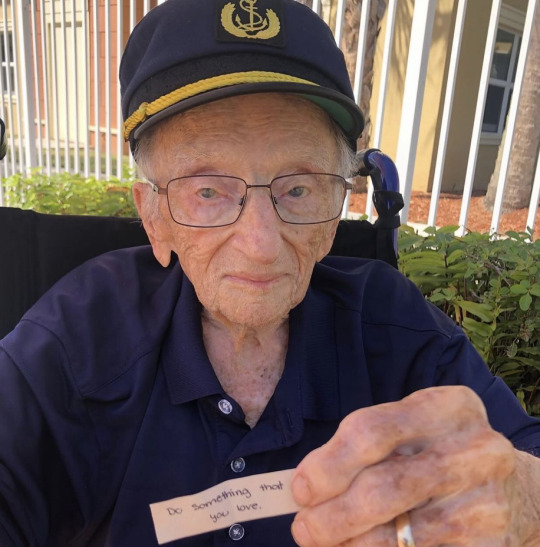
Benjamin Ferencz was born on March 11, 1920, to a Jewish family in the Carpathian Mountains of Transylvania. He was only 10 months old when his family moved to the United States and settled in the Lower East Side. In 1943, Ferencz graduated from Harvard Law School and enlisted in the U.S. Army as America was preparing to invade France. He served under General Patton and was awarded 5 battle stars. Towards the end of WWII, Ferencz was appointed as a war crimes investigator in the newly established War Crimes Branch of the U.S. Army. He gathered proof of Nazi brutality to convict individuals of international war crimes. Ferencz was a first-hand witness of the atrocities committed by the Nazis and was among the U.S. forces that liberated several concentration camps. When asked about what he had witnessed, Ferencz said, “My mind would not accept what my eyes saw. … I had peered into hell.” By the end of 1945, Ferencz returned to New York and was soon recruited by the U.S. Government to join the team for the Nuremberg Trials. At just 27 years old, Ferencz was appointed Chief Prosecutor in the Einsatzgruppen Trial, which is considered the biggest murder trial in history. Ferencz and his team were responsible for the convictions of 22 Nazi death squad commanders, guilty of genocidal war crimes and crimes against humanity and were charged with the murder of over one million people. Here is a photo from this time last year on his 103rd birthday, reminding us to “do something that you love.”
Ferencz passed away just a few weeks later on April 7, 2023. May his memory be a blessing.
humansofjudaism
87 notes
·
View notes
Text
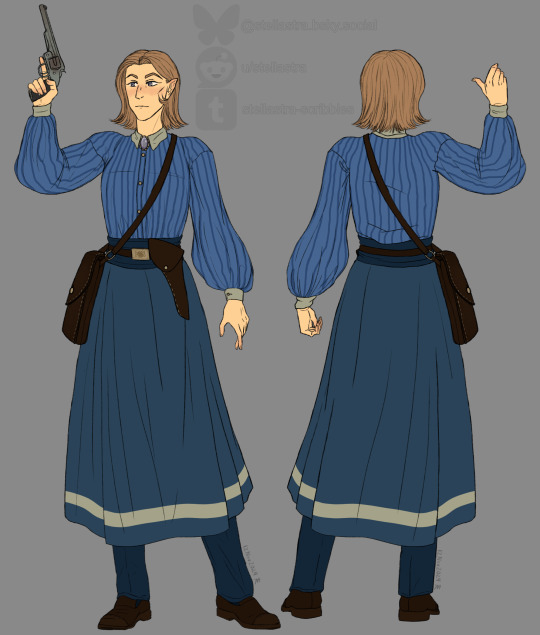
Finally completed the outfit reference for Jayna Stiles, a half-elven NPC follower from Arcanum: Of Steamworks and Magick Obscura.
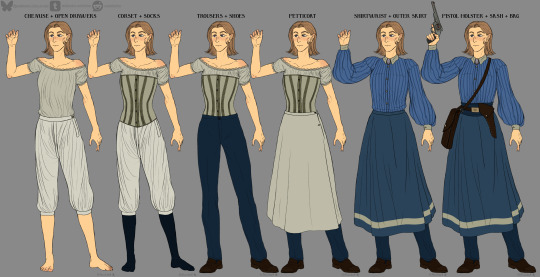
Outfit breakdown (or "outfit onions" as I like to call them lol~)
I really like Jayna Stiles and her backstory + goals of becoming a technological healer. I'm also a sucker for 19th-century fashion and I have an unhealthily large collection of reference books and a bunch of files saved from online museum collections (I've got about 22+ gigabytes of refs downloaded from the Library of Congress alone haha I need more hobbies).
More unrestrained detailed design ramblings below the cut~
Back on track, I really just wanted to design Jayna an outfit that suited her character more than her in-game sprites while also being practical for travel/adventuring.

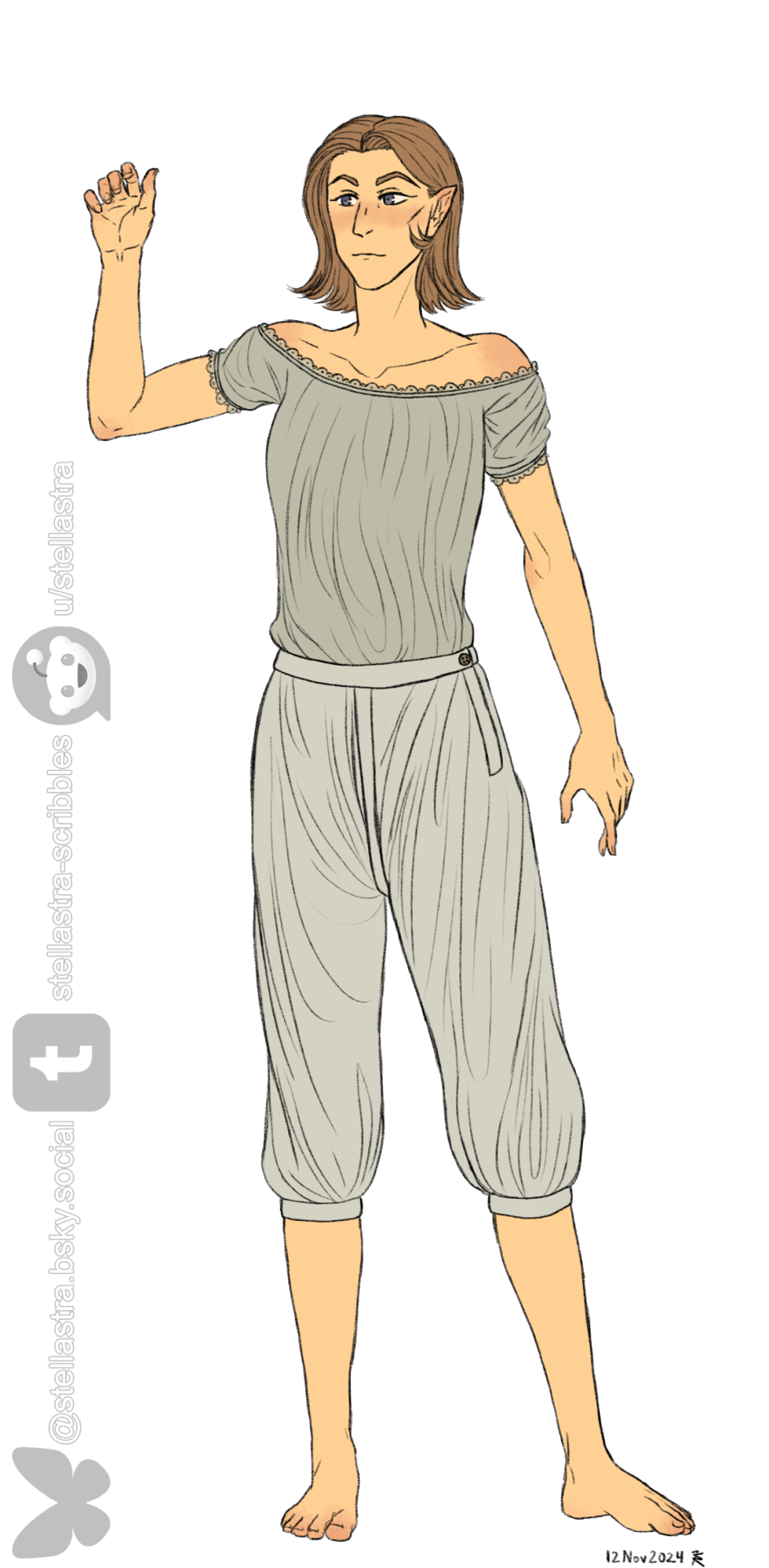
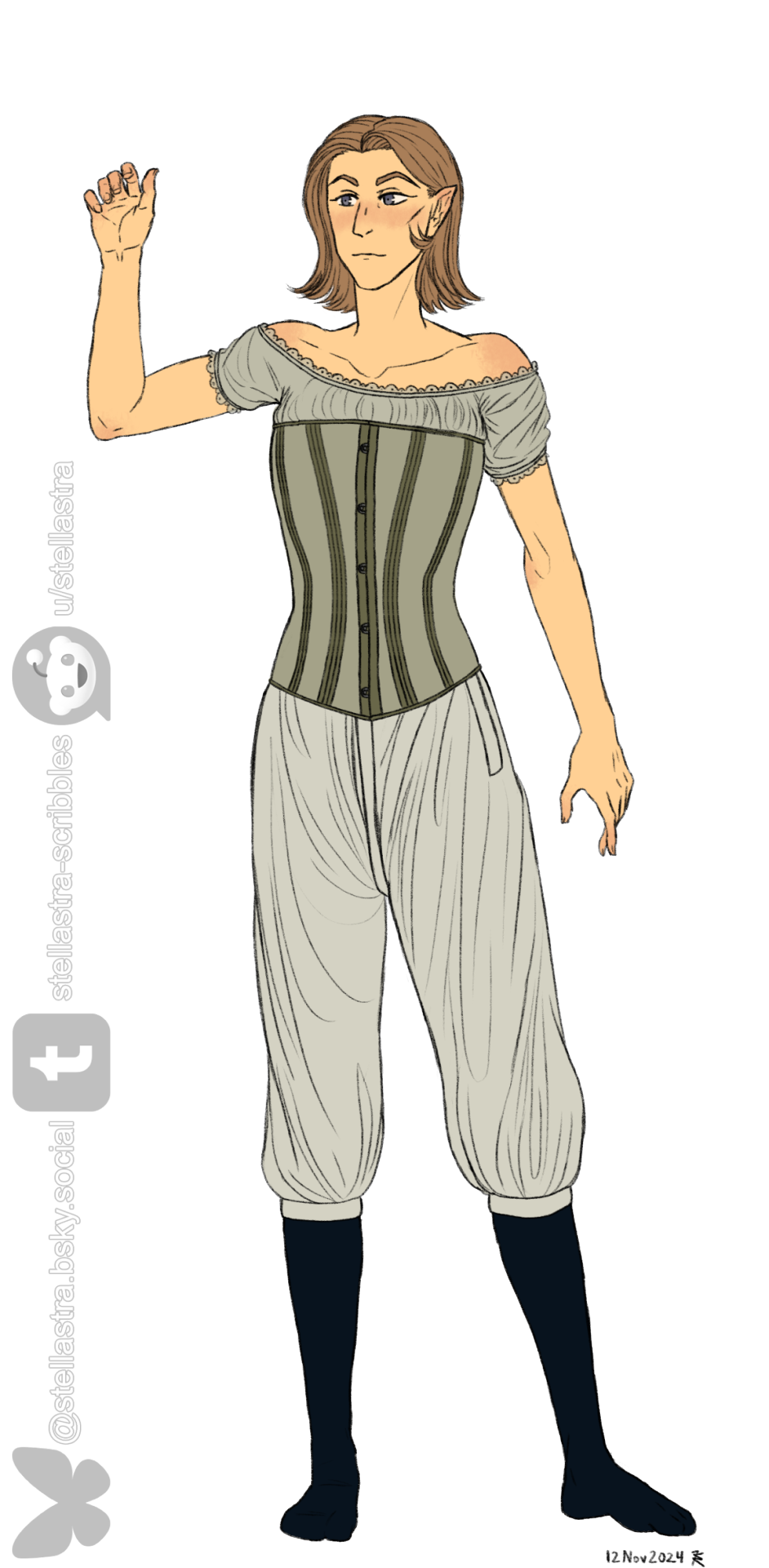
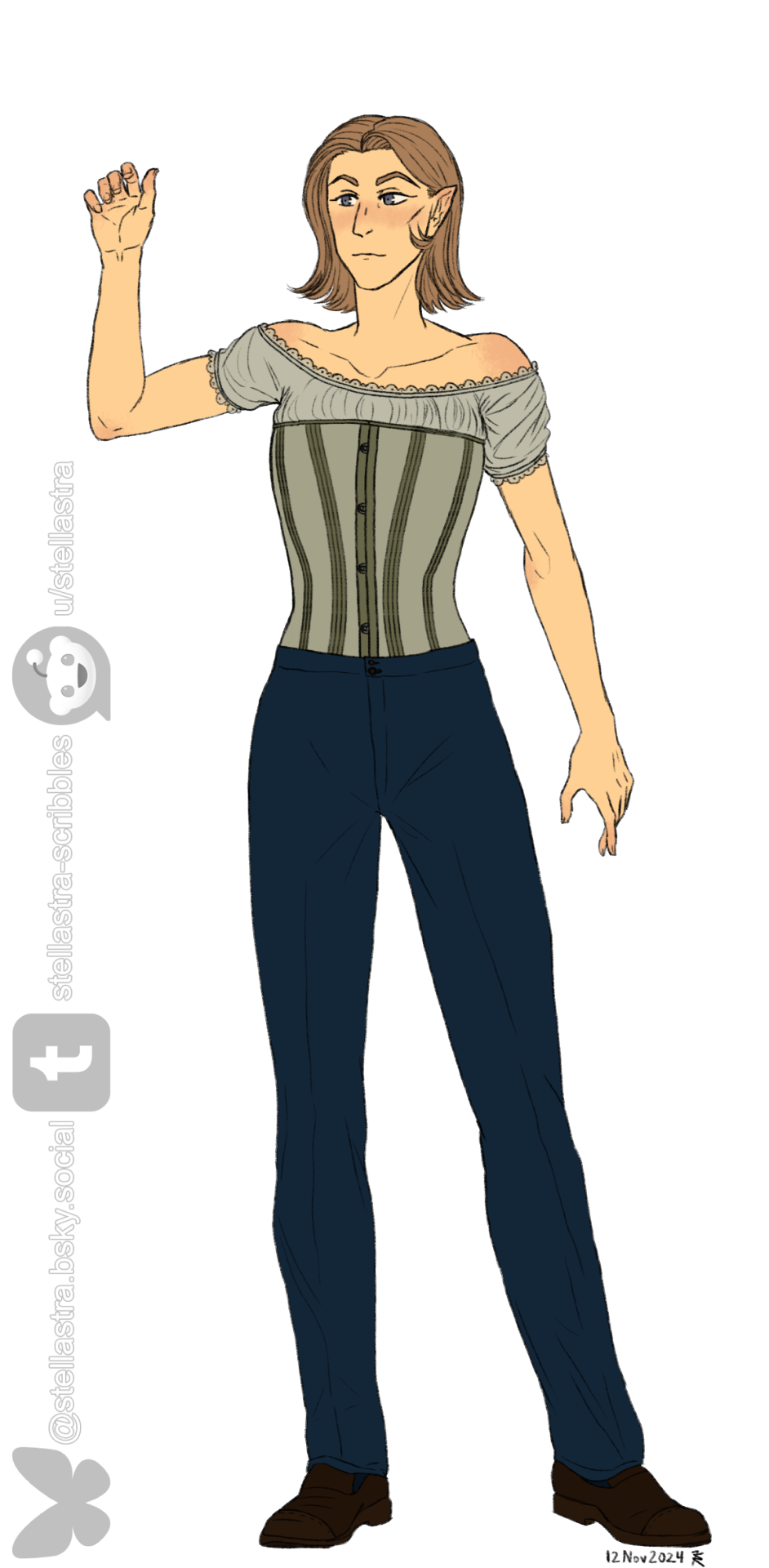
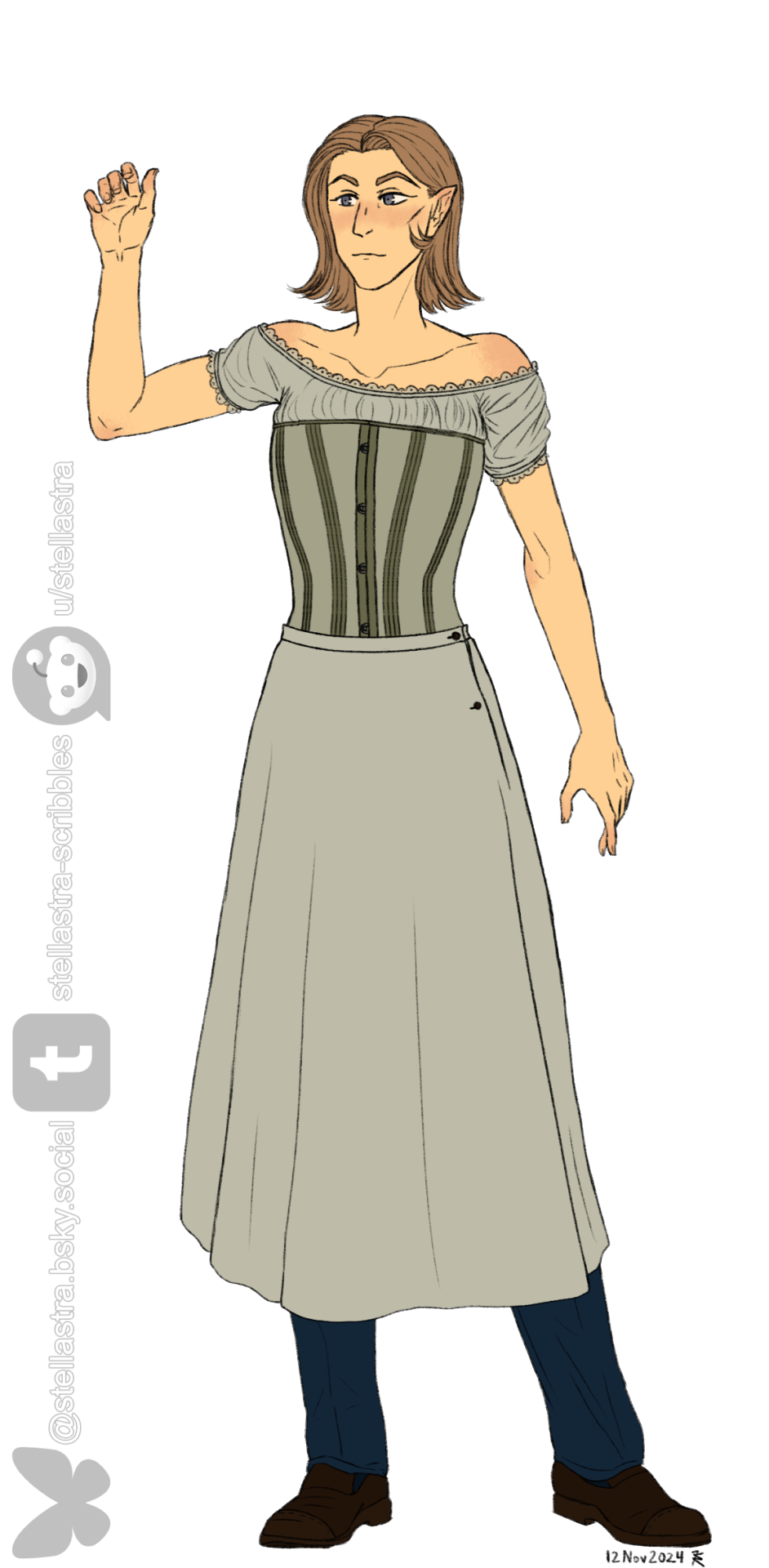
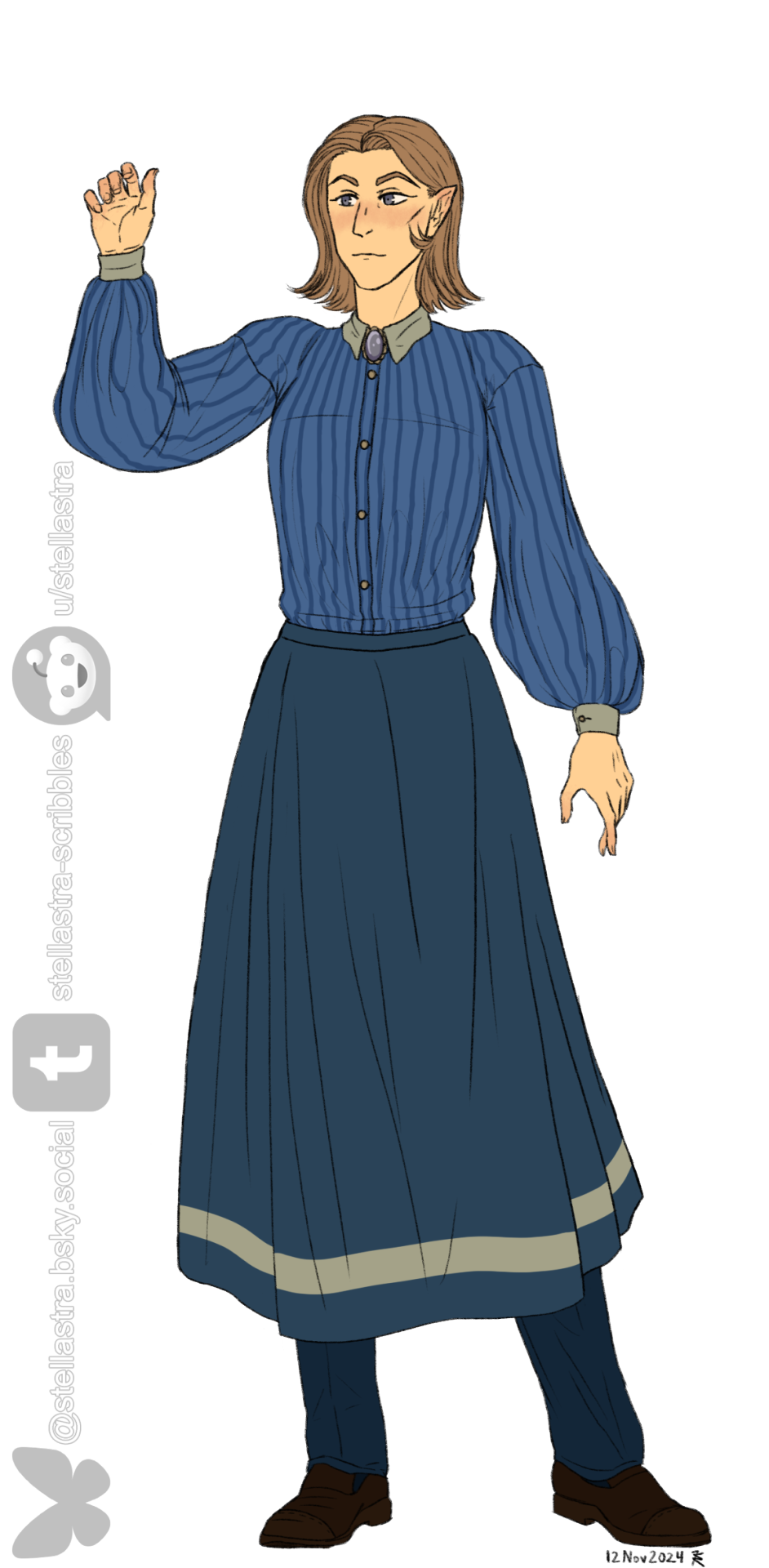
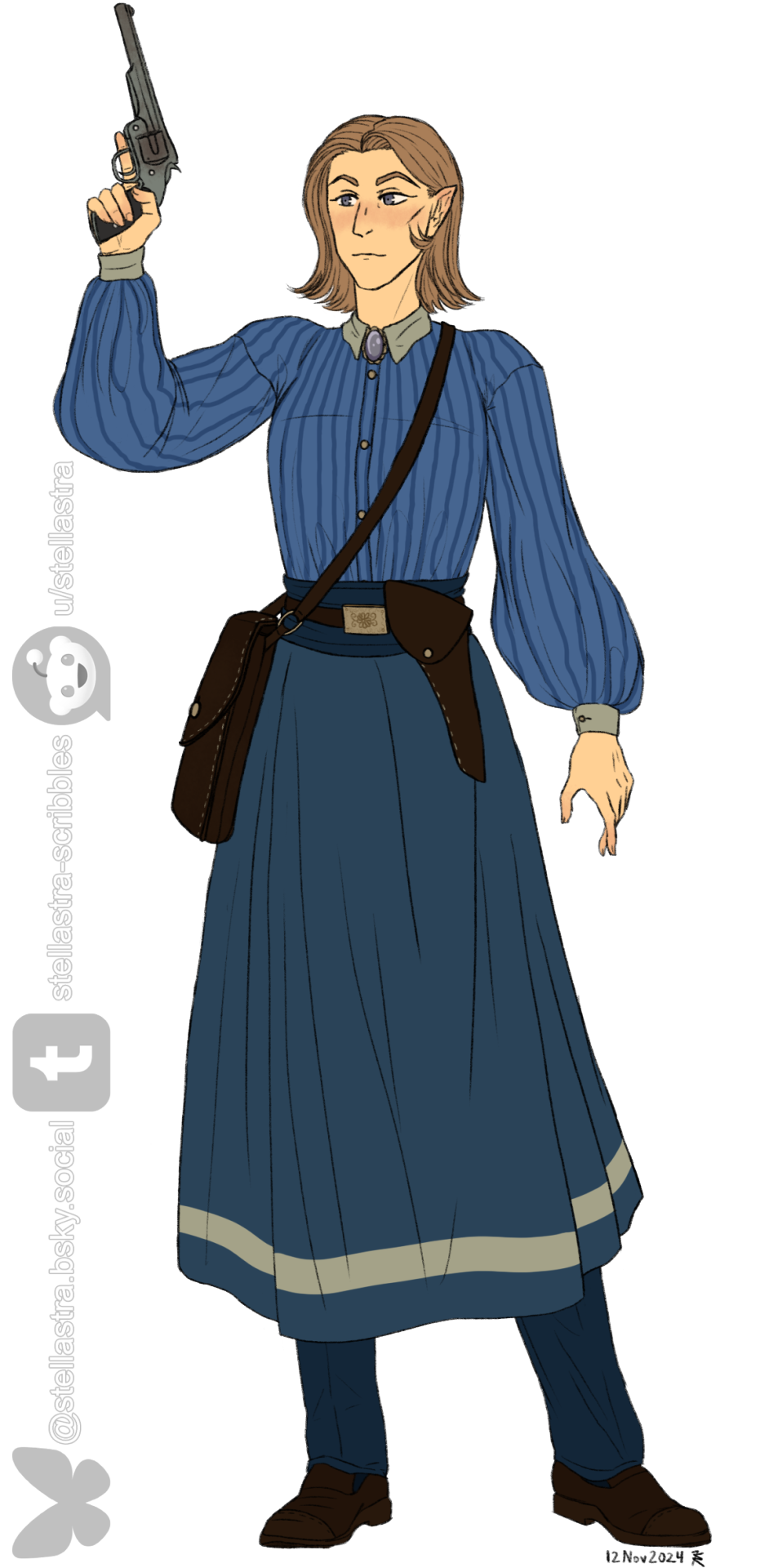

Individual layers. I pulled most of her colors from her default outfit.
Since Arcanum's starting year is 1885, I usually picture the "modern" sense of fashion in big cities like Tarant and Caladon taking cues from real life 1885-1890s western fashions (to give myself some leeway with references). Smaller towns can be a bit more dated, but I try not to go back further than the 1870s in most cases.
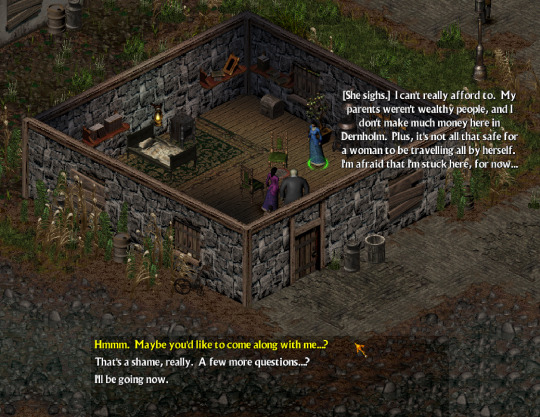
However, for a character like Jayna, who hails from Dernholm, I gave her clothing from references dating back to the 1850-1860s. I did this because Jayna says in her recruitment dialogue that "[her] parents weren't wealthy people, and [she doesn't] make much money here in Dernholm," so I took this to mean that she likely wears clothing to last, wearing hand-me-downs, makes her own clothes, and mending it over the years rather than buying new clothes.
Given that Dernholm (+ the Kingdom of Cumbria in general) isn't in the best state when the game starts, they may be behind the times and the latest fashions take longer to reach Dernholm.
Gar: “Alas, poor Dernholm! Once home to the legendary Dragon Knights, it has fallen on hard times since Praetor became king some 60 odd years ago. He despises all technology, and I think he's recently become sour on magick as well.”
Herkemer Oggdoddler: “For two generations Cumbria languished as an economically abused and technologically impaired backwater in the shadow of Tarant. Its once fine capital, Dernholm, has become a ruin.”
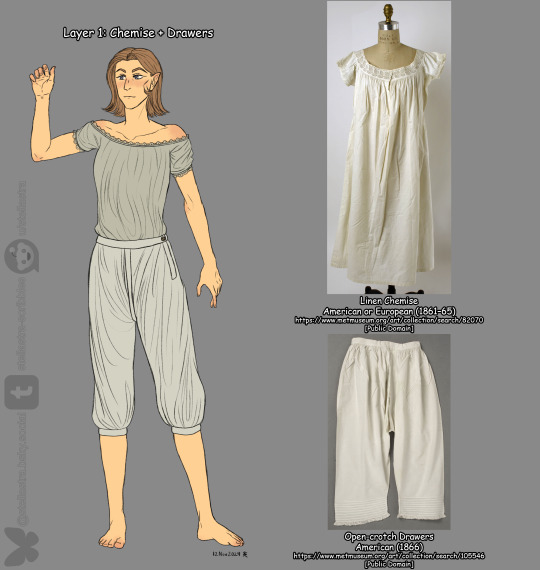
Layer 1 - Chemise + Open Drawers. I deliberately drew the drawers as fairly loose so as to not expose her without having to redraw the pose or resort to "Barbie doll anatomy."
Various resources demonstrated the chemise being tucked into the drawers or worn fully untucked/loose, but I drew it as tucked-in for the sake of reference visibility, so perhaps either one works in practice.

Layer 2 - Corset + Socks/Stockings. I picked a more "contemporary" (1880s) design for the corset as I imagine it would be a more custom-fitted garment. Plus, anyone who has ever worn bras will attest that a bra that properly fits is comparable to a good pair of shoes: never cheap out on it because if you take care of it, it will take care of you. Perhaps that same logic can be applied to corsets in ye olden days and historically-inspired fantasy settings.
For Jayna, despite the simplistic design, it might be one of the few luxuries she can afford for herself given the necessity of the garment for bust support.

Layer 3 - Trousers + Shoes. I was inspired by vivandières and Dr. Mary Edwards Walker, who typically wore trousers beneath their skirts. Dr. Walker was a "surgeon, women’s rights advocate, abolitionist, and spy, [and] the first female U.S. Army surgeon during the Civil War." Since Jayna is an aspiring technological healer, I feel like an allusion to Dr. Walker and her practicality was appropriate.
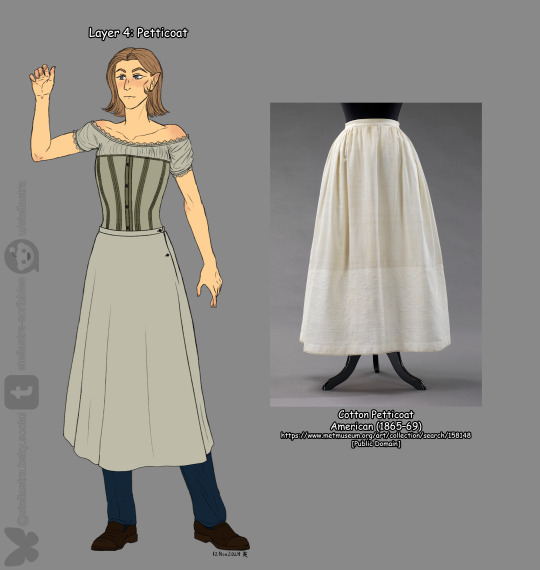
Layer 4 - Petticoat. It's just something to fill out the skirt volume a tad. I considered adding a corset cover in this layer but I did like having the upper outline of the corset somewhat visible in the shirtwaist layer to illustrate her living situation (aka she doesn't have one or just has a poor-quality one). As a modern-age woman, I think this this all already looks like a laundering nightmare to wash by hand.
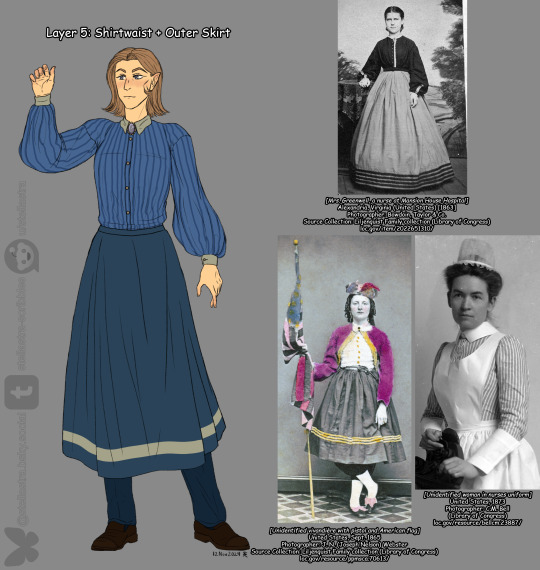
Layer 5 - Shirtwaist + Outer Skirt. I really like the shape of the 1860s Garibaldi blouse's sleeves (I think these are bishop sleeves? correct me if I'm wrong...) and the stripes allude to some 19th century nurse uniforms. I initially went for a plaid pattern but that was a pain to draw and using a pre-existing plaid brush/pattern just didn't look as good as I wanted it to be.
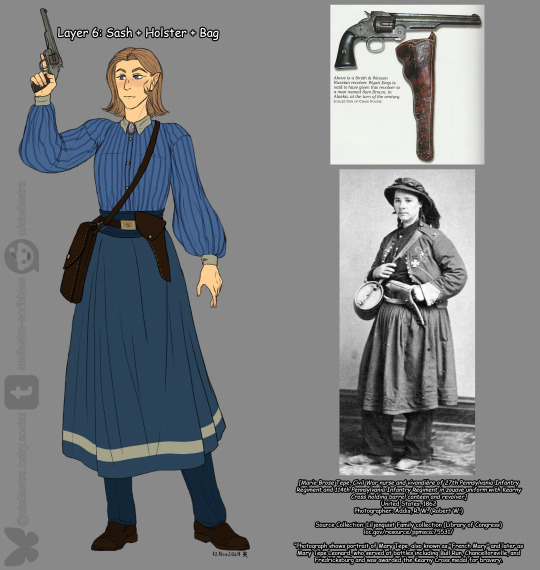
Layer 6 - Sash + Pistol Holster + Bag. Given Jayna's goals of becoming a tech healer, I took design cues from vivandières, who were 19th-century women attached to military regiments, with a few known vivandières being nurses (like Anna Etheridge).
However, rather than lifting the vivandière look completely, I imagine Jayna would attempt to replicate the silhouette with her own clothes. The bag is a bit of an amalgamation of various 18th-19th century hunting/frontier bags, so I apologize that I don't have a direct reference image.
---------------
Of course, in the end, I did take some liberties with the outfit so it's not completely historically-accurate, but that's okay since Arcanum is a fictional universe.
I guess I should've prefaced that I'm no expert on historical fashion, just a casual enthusiast who thinks "ooh old dress is pretty!"
I just wanted to see how far I could go before I had to make some concessions, such as:
Jayna's hair is short and worn loose while irl Victorian women typically had long hair and wore them up (there were documented exceptions of course). Many portraits for both female player characters and female NPCs across all in-game races show short hair and loose long hair, so let's just assume that 19th-century Arcanum has more relaxed feminine hair standards compared to the real-life 19th century western world. Also, irl 19th-century rural women did sell their hair for money, so maybe there's something to apply to the world of Arcanum with that. Or maybe the short-hair craze just hit Arcanum a few decades early *shrug*.
I initially planned to give her gloves, but many resources show vivandières not really wearing them, preferring to go barehanded.
The clothing colors may be a bit too saturated for the era I took inspiration from, but I wanted to stay somewhat faithful to Jayna's original sprite colors.
I did simplify some garments down for the sake of me having to draw enough layers as it is lol. Sorry if the lace wasn't fancy enough or that she doesn't have headwear. ¯\_(ツ)_/¯ Sometimes you just wanna finish a project and be done with it.
hoo boy, that was a lot
Thank You For Coming to My TED Talk :)
Now go play Arcanum: Of Steamworks and Magick Obscura~
#stellastra's art#Arcanum#arcanum of steamworks and magick obscura#arcanum: of steamworks and magick obscura#Jayna Stiles#half elf#historical fashion#steampunk fantasy#character design#victorian fashion#19th century fashion#unashamedly tagging this bc this game doesn't get enough love#to the like 10 or so Arcanum fans here on tumblr - this is for you!
23 notes
·
View notes